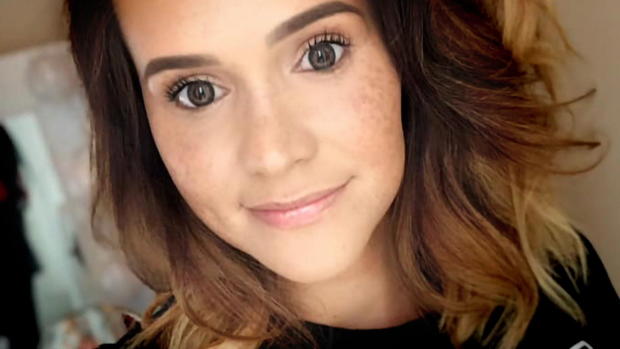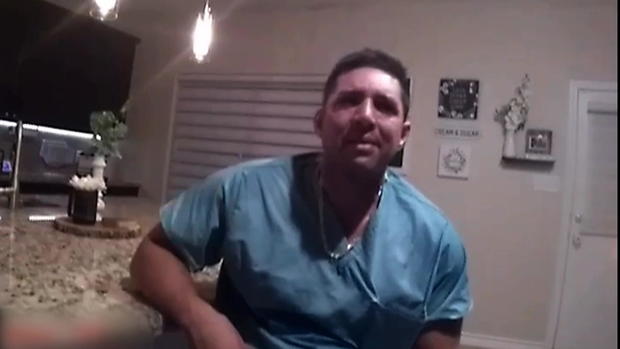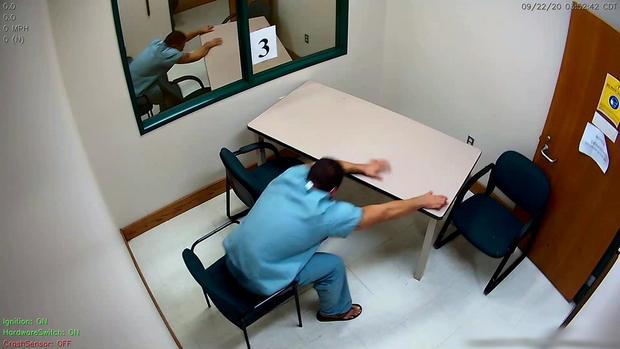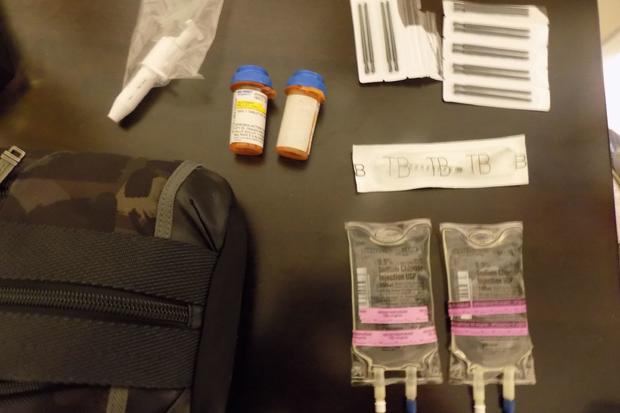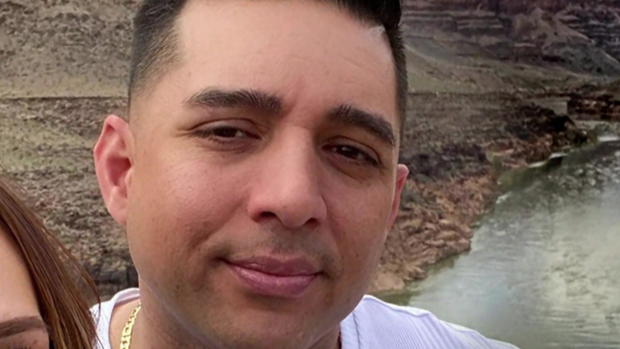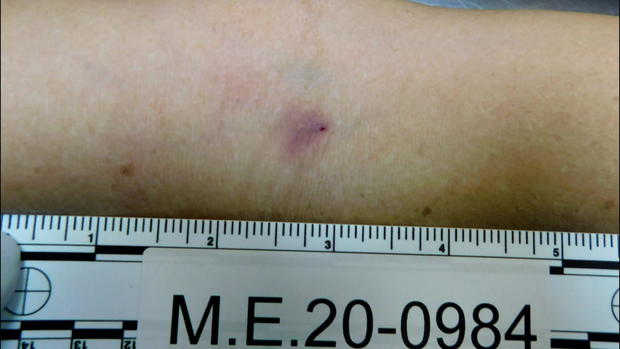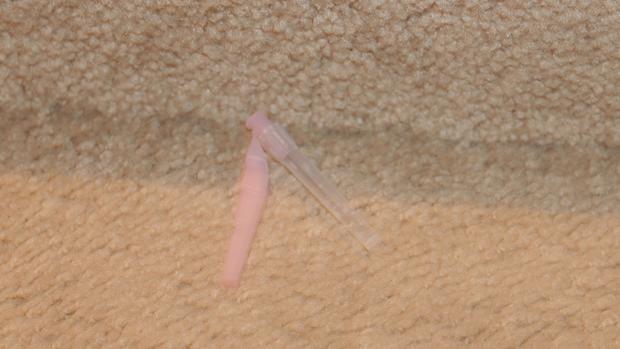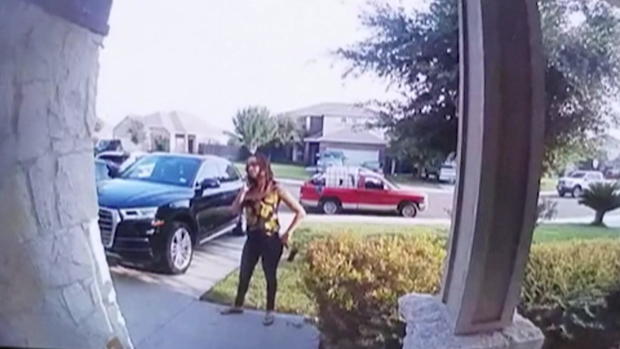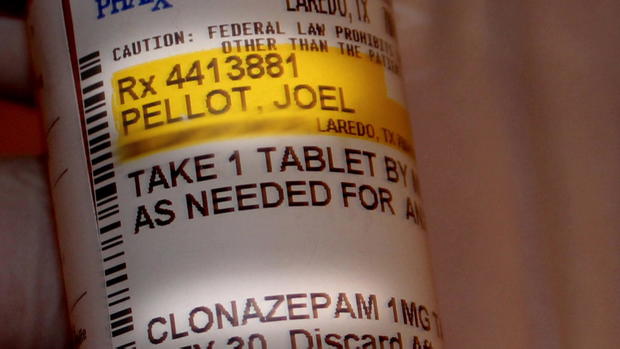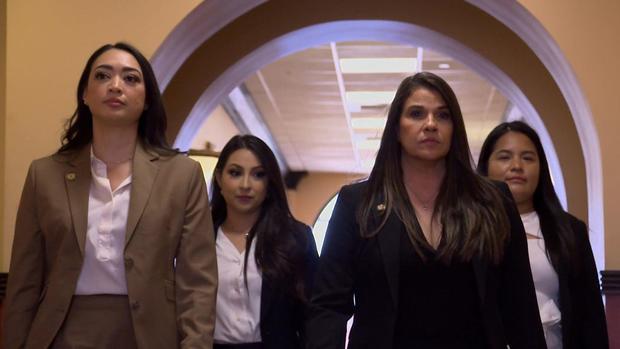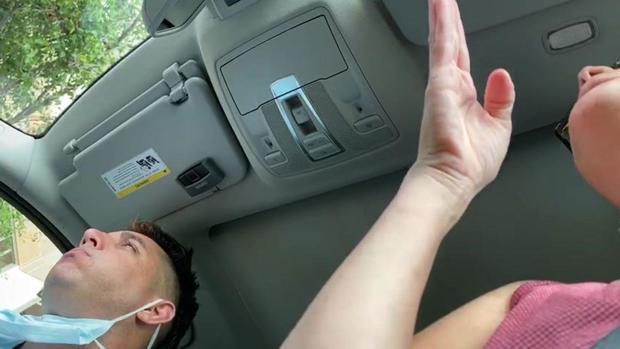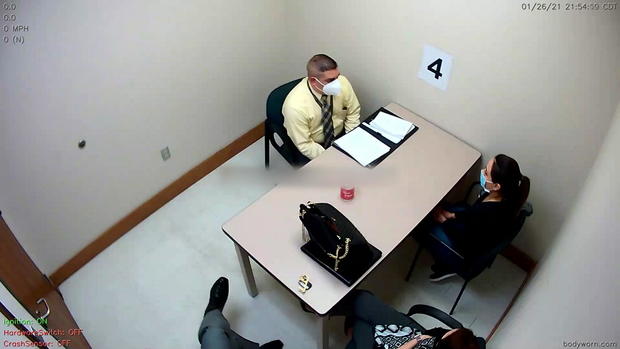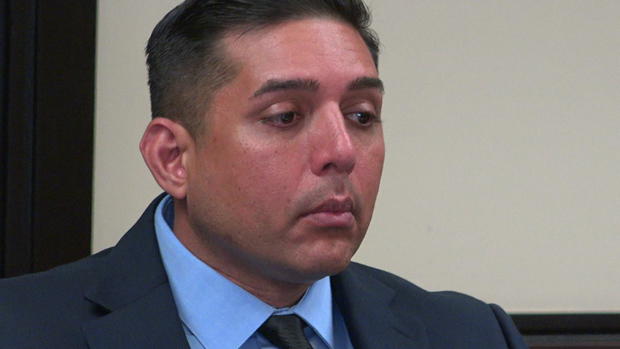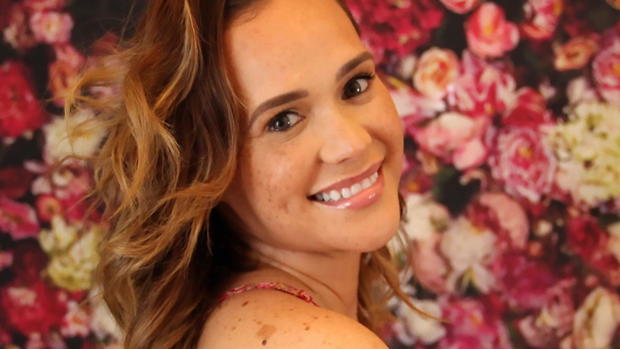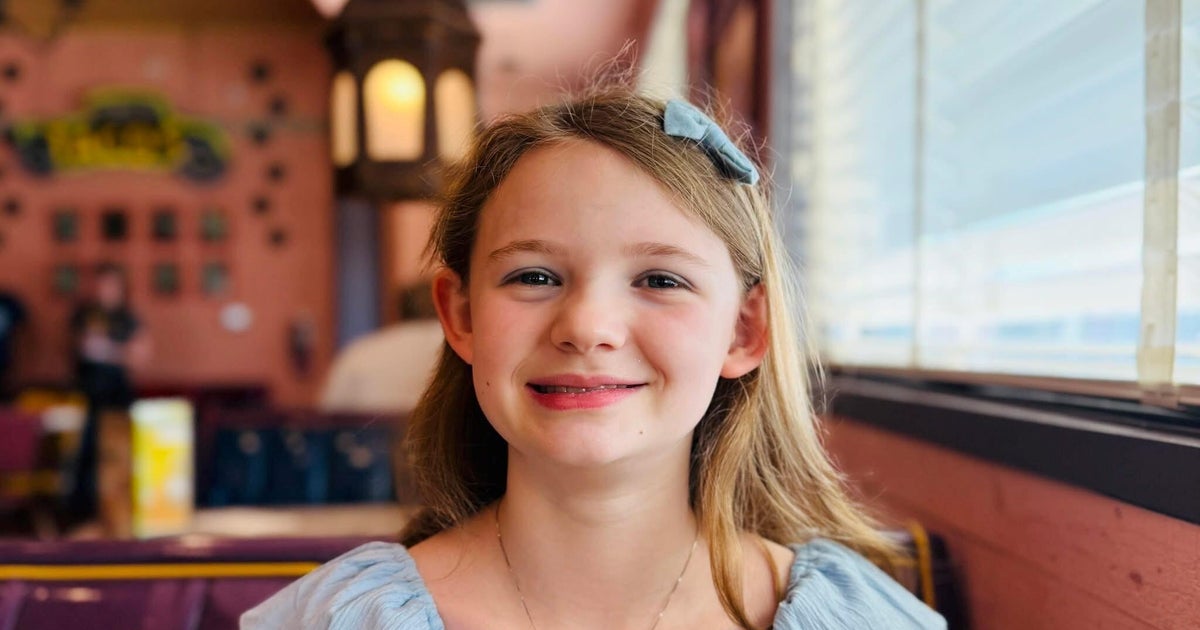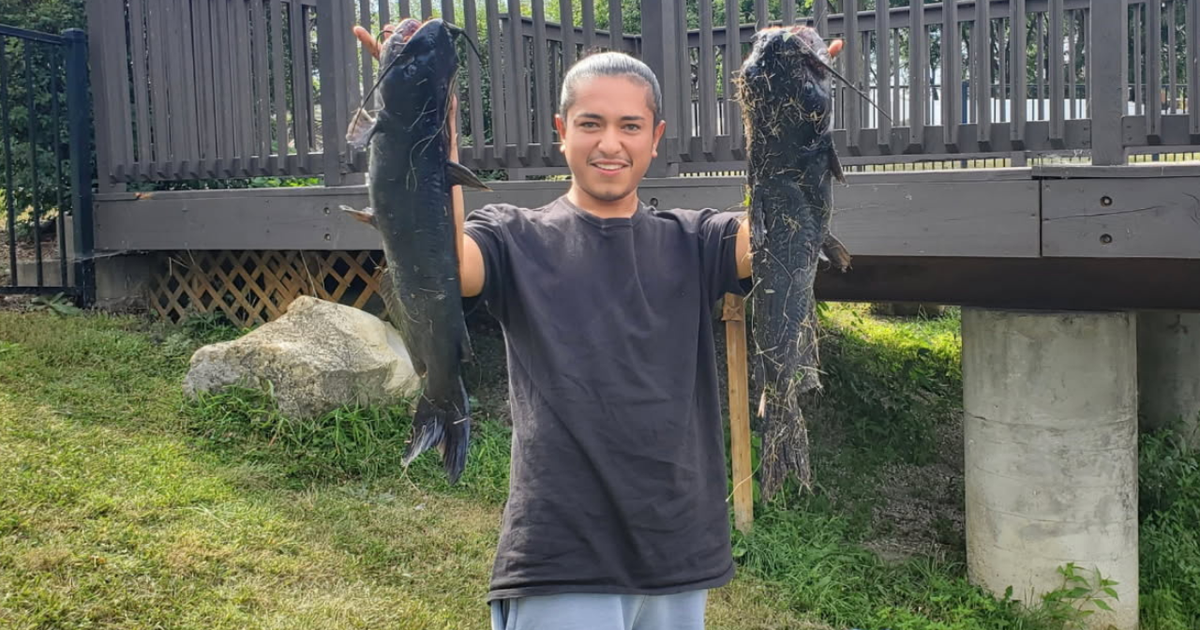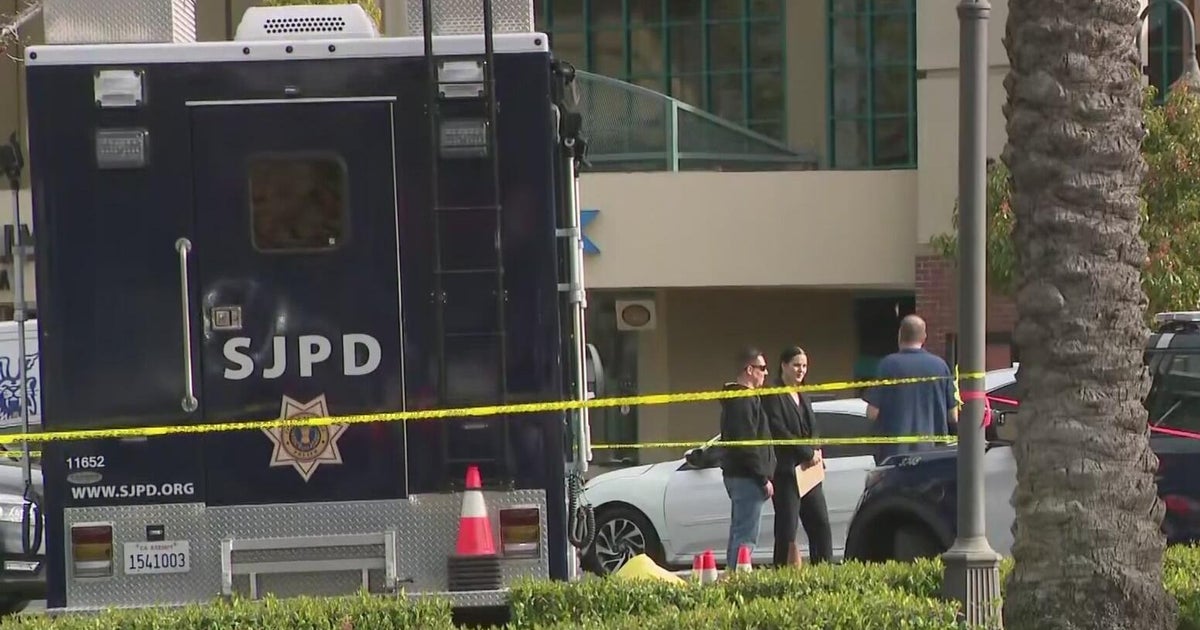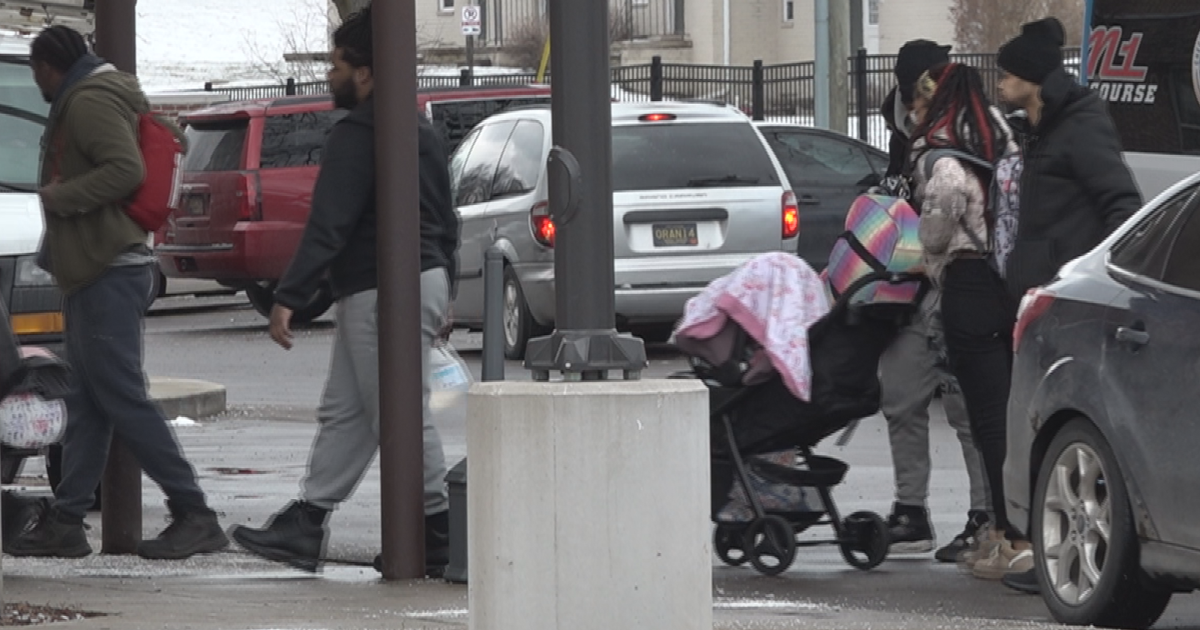How Texas mom Maria Muñoz became an important witness in her own death investigation
This story originally aired on Dec. 16, 2023
In the early morning hours of Sept. 22, 2020, when Laredo, Texas, police officer Gregorio De La Cruz walked inside the home on Canyon Oak Drive, his body camera was recording the emergency unfolding in front of him.
At the top of the stairs, near the main bedroom, Joel Pellot dressed in teal surgical scrubs, was performing CPR on his wife Maria Muñoz. De La Cruz soon took over.
Erin Moriarty: What kind of shape was she in when you started giving her CPR?
Officer Gregorio De La Cruz: She was warm. She was still warm to the touch.
While De La Cruz desperately tried to revive Maria, he asked her husband about the drugs. Pellot had told the 911 operator his wife may have taken some pills.
Officer Gregorio De la Cruz: He stands up, he goes to the restroom. … He opens a medicine cabinet. I can — I can tell all this because I hear it.
JOEL PELLOT (police bodycam video): I'm not really sure if she took them or she dropped them …
Upon his return, he hands De La Cruz a pill container.
JOEL PELLOT (police bodycam video): It's clonazepam.
Clonazepam is a drug that is often used to treat anxiety. It had been prescribed to Pellot, not to his wife Maria.
De La Cruz quickly tossed the pill container aside to continue CPR.
Pellot told De la Cruz that Maria had been struggling lately.
JOEL PELLOT (police bodycam video): Yeah, she's been super depressed.
Pellot told the officers, the couple's two young sons were still in separate bedrooms nearby — seemingly unaware of what was happening to their mother Maria.
OFFICER DE LA CRUZ (performing CPR on Maria): They are asleep?
JOEL PELLOT: Yeah.
Yazmin Martinez says her friend Maria adored her boys, 5-year-old Alejandro and Valentino, who was turning 2.
Yazmin Martinez: She would like to take her children to the park … she read to them before they went to bed. … just a really dedicated mother.
Maria enjoyed being a stay at home mom. She was learning to play the piano and planning to resume her career.
Yazmin Martinez: I asked her if she had gone to school, and she said yes that … she was a nurse in Puerto Rico and she's like I'm actually studying to take my test so I can work here.
It was in Puerto Rico where Maria met Joel Pellot. He was 11 years older and a nursing student.
A few years after they married, the couple moved to Laredo, Texas. Pellot had landed a lucrative job as a nurse anesthetist, known in the medical profession as a CRNA.
Tina Dores: A nurse anesthetist, or a CRNA, certified registered nurse anesthetist and a physician anesthesiologist use the same medication, same techniques to provide anesthesia for people of all ages.
Tina Dores, also a CRNA, worked with Joel Pellot at Doctors Hospital in Laredo.
Erin Moriarty: Did he seem dedicated to his work?
Tina Dores: Yes, very much so. … he always wanted to be better.
Tina Dores: When I first met him … he was very family orientated … a hard worker, smart guy … he would always talk about … Maria and Alejandro … and showing pictures of his son and just talking about family life in general.
And now at the Pellot home, paramedics and police were struggling to save the life of the young wife and mother.
When more help arrived, De La Cruz sent Pellot downstairs to the kitchen. And that's when De La Cruz realized that the pill container he had tossed to the side earlier was now missing.
OFFICER DE LA CRUZ (police bodycam video): He had a prescription drug, where is it?
Officer Gregorio De La Cruz: I was like, he has to have them. So that's when I asked, "Hey, does he have pills?" He comes up to the first landing of the stairs and he tosses them to me.
Officer Gregorio De La Cruz: So, he had taken them. So, now I'm thinking now you're trying to hide something.
At 3:58 a.m. less than three hours after Joel Pellot had called 911, his wife, 31-year-old Maria Muñoz, was declared dead inside their home.
Police began asking Joel what had happened to his wife.
JOEL PELLOT (bodycam video): We had sex, I took a shower. Then I thought she was, like, knocked out … And then I go back upstairs and she's just – oh God (covers his face with his hand and begins to cry).
By now, things just didn't feel right to the investigators. And there was something about Pellot's appearance that seemed suspicious.
Officer Gregorio De La Cruz: He was really sweaty … I'm wearing a vest, I'm wearing a gun, I'm wearing almost 20 pounds of gear, right, and I'm not sweating as bad as he was.
Erin Moriarty: So, what went through your mind when you saw how sweaty he was?
Officer Gregorio De La Cruz: He's using drugs. He may be under the influence of drugs.
SGT. MATA (to the couple's sons): You wanna see a fire truck? Come on let's go outside.
The couple's children, now in the care of law enforcement, were escorted outside. Authorities immediately launched a death investigation.
Sgt. Luis Mata: When I get there, I meet with Officer De La Cruz. … He runs the information by me.
Lead investigator Sergeant Luis Mata didn't know if Maria had died by suicide, an accidental overdose, or if her husband was somehow involved. Mata knew he needed to search the house, but to do it he would have to get Pellot's permission.
Sgt. Luis Mata: And he said, "Well, I don't want you going through my stuff because I'm a very private man." … Then I said, "look Joel, I'm not going to force you to, this is your right, but … I'm going to have to go and get with my DA and apply for a search warrant.
Pellot eventually gave consent for the search. Still, Mata had a lot of questions. To get some answers, he directed authorities to put Pellot in a police cruiser to take him to the station.
Erin Moriarty: Could you see him before you went in?
Sgt. Luis Mata: I could see him … through my camera.
Sgt. Luis Mata: Everything there is recorded … he's hitting walls, he's moving furniture … It was scaring some of the people down the hall in the dispatch room … so that's how loud it was …
SGT. MATA (to Joel Pellot): Holding up OK man?
Around 4 a.m., Mata begins his interview with Pellot, who claims he had given Maria that container of clonazepam prescribed to him.
SGT. MATA: Is it possible that she swallowed them all?
JOEL PELLOT: I don't know man, I don't know.
SGT. MATA: How many pills were there before?
JOEL PELLOT: I don't know.
SGT. MATA: Mas o menos? (More or less?)
JOEL PELLOT: I really don't know.
Sgt. Luis Mata: He couldn't remember the minorest things … I don't know how many times I asked him – "play back to me the minute you got there – what did you do?" … and he, well, "What did I do? What did I do? What did I do?" … Well, you know what, if you remember the truth, you don't have to think about it.
ANOTHER WOMAN
SGT. MATA (police interview): What was the time period between the time you got out of the shower … until when you noticed she's not really responding anymore?
JOEL PELLOT: Uh, 10 minutes? … I'm not 100 percent sure.
The sudden death of a healthy 31-year-old woman like Maria Muñoz didn't make sense to Mata. And neither did her husband's explanation.
Sgt. Luis Mata: His initial statement was that he went in and took a shower … he thought she was asleep. … and then 10 minutes later … He realizes that she's unresponsive.
Sgt. Luis Mata: When a common person showers … what's going to be in the bathroom? Steam, condensation, the smell of soap or shampoo … that master bedroom shower, which is the one he alleged he used, was as dry as a desert.
Investigators had also discovered a syringe wrapper on the floor and a needle catheter on the stairs. Syringes and IV equipment in a medical bag were found inside the home.
SGT. MATA (police interview): Why would there be syringes in the home?
JOEL PELLOT: So, like, I don't know.
Then, Pellot makes a hand gesture and taps his bicep.
SGT. MATA: Steroids?
JOEL PELLOT: Yeah, for, that's me.
With Pellot at the police station, Maria's close friend Angela Montoya and her husband Luis Ayala rushed over to the house to take care of the kids. Ayala, a coworker of Pellot, says he had begun to see changes in Pellot's physique and personality two years before Maria's death.
Luis Ayala: He lose a lot of weight and then started gaining muscle.
Erin Moriarty: Did you suspect that maybe he was taking steroids?
Luis Ayala: Maybe, but … I mean he was changing like … more friendly with girls …
Erin Moriarty: Flirting more.
Luis Ayala: Yeah.
The family man who once had bragged to friends and colleagues about his wife and kids began changing his social media posts, too.
Angela Montoya: He deleted the pictures of Maria, or he just started posting … everything by himself … not with his kids.
Pellot, in demand as a nurse anesthetist, was making a lot of money, and according to Montoya, he enjoyed showing off his wealth.
Angela Montoya: He has this new sporty car … "I bought Maria that one and I bought myself this one," bragging about it.
But friends say the changes they saw in Pellot went much deeper. In 2018, around the same time Maria gave birth to the couple's second son, Joel began pursuing a woman named Janet Arredondo, a surgical nurse, he met at work.
Angela Montoya: Joel took Janet to like a vacation spree in Europe. I don't recall which countries … he told me.
Erin Moriarty: Well, there was one trip— there was Spain, and the next trip was France and Greece.
Angela Montoya: There you go. There you go. So, Maria found out about that while he was there with Janet.
According to Montoya, Maria confirmed her suspicion about her husband's infidelity when she found a plane ticket for one of his European trips. When her disappointment turned into a deep depression, she was prescribed medication.
But perhaps the best medicine for Maria turned out to be her daily journals, discovered in her home by investigators:
I don't want to be sad anymore.
I don't want my heart to hurt.
I don't want my mind to be in torture.
Yet, at times she seemed hopeful, believing her faith could mend the couple's 10-year marriage:
Lord this is a lot for me,
All I really want to do is see change in him.
And it seemed to be working. Just months after her husband had taken his mistress on those European vacations, Pellot treated Maria to a lavish getaway in Las Vegas.
Angela Montoya: And she showed me a couple of Louis Vuitton … he purchased for her.
But what seemed like a second chance for her marriage didn't last. Pellot could never quite leave Janet.
SGT. MATA (police interview): How long have you been with Janet?
JOEL PELLOT: About two years.
SGT. MATA: Out of those two years, how long has Maria known about it?
JOEL PELLOT: (sighs) For a while. For a long while.
In fact, Pellot told Mata that he no longer lived with his family and that he had moved in with Janet Arredondo five months before Maria's death. Mata wondered how much the other woman knew and asked her to come to the police station to talk.
SGT. MATA (police interview): What is your relationship with him? I wouldn't have called you at 6:30 in the morning if it was just for, for being nosy. It's not that I'm trying to be nosy, but I'll get to where I'm going.
JANET ARREDONDO: Um, he's — he's my boyfriend.
Mata continued pressing Arredondo about Pellot – and then told her about Maria.
SGT. MATA (police interview): The reason that I'm here is because … last night Joel's wife passed away. … There doesn't appear to be any, right now, type of foul play … We're still pending an autopsy. … So let's get with, how did you, and Joel even start dating.
JANET ARREDONDO: Um, I'm sorry.
SGT. MATA: Um, I understand. Take your time. I know it's all kind of thrown at you, so, you know, I, I told you at the very beginning, I'm gonna be honest with you. So I am, uh, our main thing now is obviously what happened.
JANET ARREDONDO (holds her head in her hands): Um, I'm sorry, what was your question?
SGT. MATA: How, when did — how long have you and Joel been dating?
JANET ARREDONDO: Uh … Um, almost two years now.
SGT. MATA: OK … Did Maria, his wife, did she do drugs?
JANET ARREDONDO: Not that I'm … aware of. … he just told me that he, she was very depressed.
When Sergeant Mata mentioned Maria may have overdosed, Arredondo seemed surprised.
JANET ARREDONDO: Wait minute, are, are you saying she overdosed?
SGT. MATA: We don't know yet. … the main thing is this, Janet, is when we tell her family ...They're gonna think that either Joel … killed her or that you had something to do with it, that's all we have to rule you out. OK. ... Has Joel ever confided in you that he was, that he wanted to do something to his wife?
JANET ARREDONDO: No.
Pellot had told police Maria may have overdosed on the drug clonazepam, but when the autopsy was conducted — eight hours after Maria was declared dead — the medical examiner found no pill residue in her stomach. There was something on Maria's body at the scene that puzzled both the medical examiner and investigators: a tiny mark on Maria's right arm.
Sgt. Luis Mata: It was a little, little prick — kind of like whenever you, the common person … has their blood checked when they go to the doctor. One little dot.
Erin Moriarty: That's it.
Sgt. Luis Mata: On her right elbow crease.
Erin Moriarty: No other signs of drug use or anything like that?
Sgt. Luis Mata: Nothing, Nothing.
Officer Gregorio De La Cruz: Nothing.
The autopsy report states Maria died from a mixed drug intoxication. While the medical examiner couldn't say how the drugs got in her system, she did rule out suicide after talking to Maria's friends and reading her journal.
On the day before she died, Maria wrote:
What is it that I want?
#1 Move Forward!!
So, could Maria's death have been an accidental overdose? Or was it murder? When Dr. John Huntsinger, an anesthesiologist and Pellot's former boss, heard the autopsy results, he immediately became suspicious.
Dr. John Huntsinger: I called Detective Mata, and I told him my concerns.
He urged Mata to order a detailed toxicology screening to determine which drugs had killed Maria and how they got there.
SGT. MATA (police interview): Did you inject her … tonight?
JOEL PELLOT: No.
SGT. MATA: With anything?
JOEL PELLOT: No.
Authorities would have to wait nearly four months to get the answers they needed.
SUSPICIONS CONTINUE TO GROW AGAINST JOEL PELLOT
On a Sunday afternoon at the First Baptist Church in Laredo, a large crowd of family and friends came to mourn Maria Muñoz, including her estranged husband, Joel Pellot.
CHURCH SERVICE: The victorious life is — is also a life of service. … All of our lives were impacted by the precious life of Maria.
Yazmin Martinez: Her funeral was really sad … Joel was there and he was crying. He seemed very upset, very sad.
To Maria's friend Yazmin Martinez, he seemed a little too upset, too sad.
Yazmin Martinez: What made me feel angry … was him near the casket … crying over her, giving her kisses. Like why now? You have made her suffer and cry so much and you're doing this now?
Joel Pellot's display of grief did nothing to deter the investigation into his wife's death.
Sergeant Luis Mata and Officer Gregorio De La Cruz say that footage captured by the bodycam on the morning Maria died shows something curious. Remember the pills in a container that Pellot said his wife had taken? De La Cruz tossed it aside when he was giving Maria CPR.
OFFICER DE LA CRUZ (bodycam video): He had a prescription drug, where is it?
At some point it disappeared.
Erin Moriarty (watching the bodycam video): I see it's still here right now.
Sgt. Luis Mata: It's still there exactly.
And here's how it happened. They say Pellot grabs the pill container and puts it in his pocket.
Officer Gregorio De La Cruz (watching the bodycam video): He just reached over and … put it right back in the shirt.
Officer Gregorio De La Cruz: If that's really what she took, why would you want to hide that?
They were also suspicious of that needle catheter, the kind used for IVs, discovered at the scene. Remember, Maria had a tiny mark on her right arm. Mata shared his concerns with the Webb County District Attorney's Office.
Marisela Jacaman: We have a 24/7 phone … and law enforcement can contact us with any questions.
Chief Assistant District Attorney Marisela Jacaman and District Attorney Isidro Alaniz knew the case would be tough to prove since even the medical examiner wasn't sure exactly how Maria died.
Erin Moriarty: The medical examiner is saying, I can't say for a fact this is homicide.
Isidro Alaniz: I remember having this conversation with the medical examiner early on … and I remember her saying look, I wasn't there, and neither were you. All we know is that she has this combination of dangerous drugs in her bloodstream … we don't know who gave them to her, if she had some in her system already, if she took some later on.
Erin Moriarty: Either accident or murder.
Isidro Alaniz: Accident or murder.
Investigators began to question Maria's friends and discovered that the Saturday before Maria died, there was a confrontation at Janet Arredondo's house when Maria saw Pellot's car there.
Angela Montoya: So, that's when she stepped out of the car and then she rang the doorbell.
According to Montoya, Maria, seen on Janet's doorbell camera, gave Pellot an ultimatum.
Angela Montoya: "Do you choose her, or you choose me?: And then he says … "I choose Janet."
Arredondo called police, and when a responding officer arrived at her home, he called Maria who had by then had left with Pellot. When Maria answered her cellphone, the officer's bodycam recorded the sound of Joel berating her in the background:
JOEL PELLOT (cellphone video with Maria in the car): Hey, I'm f------ talking to you right now. Hang up the f------ phone.
RESPONDING POLICE OFFICER: I guess that's your boyfriend.
JANET ARREDONDO: Yeah.
According to Montoya, Maria told her that Pellot became violent.
Angela Montoya: And he got so frustrated with everything that he punched the windshield.
Erin Moriarty: He broke it —-didn't he?
Angela Montoya: He broke it, yes, he broke it.
On Sunday morning, Maria texted her husband about hiring a divorce lawyer, and he replied:
JOEL PELLOT TEXT: We can do this with minimal lawyer intervention. It's too much money.
Pellot then seems to have had a change of heart, and sends Maria this email:
JOEL PELLOT EMAIL: I am so sad I am hurting inside…
I want to sit down with you to talk, w/o arguing. A heart to heart.
They agreed to meet Monday night. Before Pellot arrived, Maria messaged her friend Yazmin Martinez to pray for her:
… I just ask if you can pray for me ... tonight we are going to talk …
Yazmin Martinez: And then I answered her … And I told her that I would pray for her.
Maria's request for prayers that night would be her final message to Martinez. Maria died early Tuesday morning.
Nearly four months after Maria's death – Sergeant Mata and Officer De La Cruz finally get the toxicology test results they had been waiting for.
Sgt. Luis Mata: Zero clonazepam.
Zero clonazepam — the drug Pellot claimed Maria had taken. Instead, the toxicology report revealed seven other drugs in Maria's system.
Sgt. Luis Mata: So, positive for morphine, Demerol, Versed, propofol -- ketamine, lidocaine, Narcan.
Most of these medications are typically used during surgery and one of them can only be administered with an IV.
Erin Moriarty: What was your reaction?
Sgt. Luis Mata: He killed her. This guy killed his wife.
Authorities got a warrant, Officer De La Cruz, who had tried to save Maria's life, returned to Pellot's home to make the arrest.
Officer Gregorio De Laz Cruz: He knew why we were there.
Sgt. Luis Mata: By the time we knock on the door, and we announce our presence … just like the way you do in the movies, he comes out. "I'm here. I'm here." Put's his hands behind his back. Let us cuff him. Doesn't put up a fight.
JOEL PELLOT: You can call my, uh, my attorney.
OFFICER De La Cruz: Oh, you can call them.
Pellot was taken to the police station and booked. Prosecutors believe he was the one who gave his wife the deadly mixture — but can they prove he wanted her to die?
DEATH BY PROPOFOL?
When Joel Pellot's former boss, anesthesiologist Dr. John Huntsinger saw the list of drugs found in Maria Muñoz – seven different medications — he was surprised by one drug in particular.
Dr. John Huntsinger: I was very shocked to see propofol.
Erin Moriarty: Where would he get that propofol? You can't just go to the drug store to get propofol?
Dr. John Huntsinger: You have to get it from a hospital.
While most of the drugs found in Maria's system could be consumed by mouth, Propofol is usually injected by someone else with an IV.
John Huntsinger: One of the things about propofol … it relaxes you greatly … but it doesn't last very long. … it makes you stop breathing if you have too much.
Erin Moriarty: I think most of us, when we hear about Propofol, we think of Michael Jackson.
Dr. John Huntsinger: Correct.
Singer Michael Jackson's death in June 2009 was blamed, in part, on an accidental overdose of Propofol. And after Maria Muñoz's death, a highly elevated level of the drug was found in her system.
Dr. John Huntsinger: Hers was the highest level I've seen.
Erin Moriarty: And what does that say to you?
Dr. John Huntsinger: I believe this was death by Propofol.
With Joel Pellot now under arrest, authorities were convinced that Pellot's girlfriend Janet Arredondo knew more than what she shared in that first interview.
Arredondo agreed to a second police interview and, accompanied by attorneys, she now seemed ready to talk.
SGT. MATA (second police interview): Did Joel ever bring home any medical drugs?
JANET ARREDONDO: Yes.
Arredondo told police that Pellot had often brought drugs to her home – some for his own recreational use — including ketamine, morphine, lidocaine, fentanyl and more.
JANET ARREDONDO: Versed
LUIS MATA: OK.
JANET ARREDONDO: Propofol.
SGT. MATA: Propofol?
Arredondo's information about propofol kicked the case into high gear. District Attorney Isidro Alaniz selected a team of attorneys – Katrina Rios, Ana Karen Garza, Cristal Calderon and led by Marisela Jacaman.
Marisela Jacaman: We are Maria's team.
So, they got a search warrant for her home. Then, they offered her a deal. In exchange for more information, Arredondo would get immunity from prosecution.
All four prosecutors were convinced that Maria's husband had methodically planned her murder, and that the devoted mother and wife had suffered in the months before her death.
Marisela Jacaman: I've heard of emotional abuse, I've seen it, I've worked around it …
Marisela Jacaman: … but I never realized how prevalent it is even in our lives where you can relate to some of the things that Maria was experiencing.
Erin Moriarty: On the face of it, this is a couple having problems, he's having an affair, but to you, this is domestic violence, how?
Karina Rios: Well, I think … it goes so much further than just being a spouse … you could see the power struggle that existed or the — the lack thereof.
Assistant District Attorney Karina Rios.
Karina Rios: Maria had no power in this relationship.
And the evidence of that, prosecutors say, is found in Maria's own journals. Prosecutor Jacaman read one of those entries:
Life is so unfair.
My husband the man I love so much is causing me so much pain
Maria also left evidence on her cellphone that she secretly recorded approximately four months before her death:
MARIA MUÑOZ (cellphone video in the car with Joel Pellot): I want to know, what is it that you want me to do?
MARIA MUÑOZ (cellphone video in the car with Joel Pellot): What are the expectations you have on this -- this marriage?
Marisela Jacaman: She gave us this very powerful video.
MARIA MUÑOZ (cellphone video in the car with Joel Pellot): You walk out that door, we're getting a divorce.
JOEL PELLOT: Alright fine, you got it (slams car door)
Marisela Jacaman: She was having a discussion … with him … and that was so painful to watch.
But prosecutors would need much more than that video and Maria's journal entries. How did they believe that Joel Pellot dosed his wife with all those drugs?
Marisela Jacaman: That was the million-dollar question. We kept saying, how did he get her to submit to this?
During Janet Arredondo's second police interview, she said Pellot had told her about the night Maria died: he had gone there, he said, to have that heart-to-heart talk and then injected her — not to kill her, Pellot said, but to calm her down.
SGT. LUIS MATA (second police interview): Why did he tell you that he injected her? Because she was erratic?
JANET ARREDONDO: Right, he wanted to uh, just calm her down, so he did it with medication.
But Investigators believe the sedatives were part of Pellot's plan to kill Maria — that before Pellot put an IV needle in Maria's arm, he could have slipped several sedative drugs into her favorite drink: coffee.
Marisela Jacaman: Ketamine, Versed, morphine and Demerol. Those four could have been put in her coffee, she then passes out.
After that, they say, Pellot injected Maria with a deadly dose of propofol. Then-Chief Assistant District Attorney Ana Karen Garza Gutierrez says Pellot deliberately waited to call for help.
Ana Karen Garza: I believe he waited until she was dead to call 911 to make sure that no one can bring her back.
SGT MATA (second police interview): Did you play any role in Maria's death at all? You?
JANET ARREDONDO: No.
Arredondo said Pellot did admit to her that he got rid of some of the medical equipment he used to inject Maria before first responders arrived.
JANET ARREDONDO: He just told me he got rid of them.
Pellot was out on bail, so prosecutors had him rearrested and along with murder, he was charged with tampering with evidence. Again, he made bail and would wear an ankle monitor.
In March 2023, two-and-a-half years after Maria Muñoz's death, her husband went on trial for her murder.
"48 Hours" made several interview requests to Joel Pellot's defense team, but never received a response. Joel Pellot declined our request for an interview.
MARISELA JACAMAN (opening statement in court): The evidence will show that Joel Pellot had the motive, he had the intent, and he had the means to kill Maria.
Prosecutors presented 15 witnesses to prove to a jury that Pellot had carefully and intentionally selected the drugs to kill Maria. Their star witness, Janet Arredondo, told the jury what she had shared with police.
MARISELA JACAMAN (in court): Did Mr. Pellot indicate to you that he dumped or discarded the IV catheter and the vials?
JANET ARREDONDO: Yes.
When the defense case begins, Pellot's lawyers admit their client injected his wife, but they say he wasn't trying to kill her, he was trying to save her.
ACCIDENT OR MURDER?
Joel Pellot, wearing a blue suit and a dark grey tie, listened carefully as his defense team presented his case.
ROBERTO BALLI (in court): Now, Maria died and there's no question that Joel was there.
Defense attorney Roberto Balli claims Maria was terribly depressed and had been drinking and abusing drugs for months.
ROBERTO BALLI (in court): When Joel arrived Maria was already on something…
According to the defense, Pellot didn't intend to kill his wife and the proof, his attorneys say, is in that toxicology report. They admit Pellot gave his wife medication to calm her down, and then when he found her unconscious they say, he gave her Narcan, a drug used to reverse an opioid overdose.
ROBERTO BALLI (in court): Someone tried to bring her back to life, and it wasn't the paramedics, it wasn't the police. It was Joel. So he did not want her dead. This was a terrible accident.
A terrible accident, the defense argues, that was caused by a combination of whatever Maria had taken and the medication Pellot used to inject her.
Erin Moriarty: How do you know that Narcan wasn't there because he tried to save her, that he went too far, realized that he had gone too far.
Ana Karen Garza Guiterrez: Narcan is not a reversal agent for Propofol and Propofol was what stopped her heart at the end.
The defense never explained to the jury how the propofol got into Maria's system, but prosecutors say that the level of drugs discovered in Maria's body could not have been accidental.
Marisela Jacaman: It was enough medication to survive two major surgeries. It was so much.
Erin Moriarty: And why do you think he gave her so much?
Marisela Jacaman: To be sure.
While Pellot himself didn't testify, his emotional mother did. Miriam Carrasquillo told prosecutors, during cross examination, that Maria had talked about how sad she was about her marriage.
MARISELA JACAMAN (in court): Were you aware that Joel Pellot was seeing Janet, weren't you?
MIRIAM CARRASQUILLO: Yes, she told me.
MARISELA JACAMAN: Who told you?
MIRIAM CARRASQUILLO: Maria.
MARISELA JACAMAN: And did you encourage her to stay in the marriage?
MIRIAM CARRASQUILLO: I told her that everybody have a limit and she have a limit. When she decide that she don't want to be no more with him I have a house open for her.
But prosecutors insist as sad as Maria may have been about her marriage, there is no evidence that she abused either drugs or alcohol.
They believe Pellot's motive was money and that he murdered Maria because he didn't want to pay for a divorce and split his assets.
After eight days of testimony, the jury got the case. It took them less than an hour to decide Joel Pellot's fate: guilty of murdering his wife Maria and tampering with the evidence.
Many members of the medical community attended the trial, including Pellot's former colleague, Tina Dores.
Tina Dores: He's not dumb, I mean he's a smart guy … so I don't know if he just got caught up with his God complex that he thought he was smarter than everyone and that he was going to outsmart them.
Just hours after the guilty verdict, Pellot was sentenced to life in prison, cuffed and escorted out of the courtroom.
Maria's friend Angela Montoya.
Angela Montoya: She loved him, and she adored him. She just loved him too much.
Prosecutors got justice for Maria, but it's a tragic ending for the family she loved and fought so hard to keep together.
Karina Rios: I think sometimes the worst injuries don't even leave a mark … the injuries on your heart, on your mind. We could never see those on Maria, but she told us about them … but she carried a lot of scars with her from this relationship.
Maria's team say the most important witness at trial ended up being Maria herself, and that her journals showed those scars were healing.
Ana Karen Garza: She was a wonderful soul.
Marisela Jacaman: And she was a great mother. She was just an amazing person. And that energy? We felt it.
The couple's children are living with Joel Pellot's mother.
Produced by Marcelena Spencer. Iris Carreras is the field producer. Marlon Disla, Michael Vele and Phil Tangel are the editors. Elizabeth Caholo is the development producer. Lourdes Aguiar is the senior producer. Nancy Kramer is the executive story editor. Judy Tygard is the executive producer.

